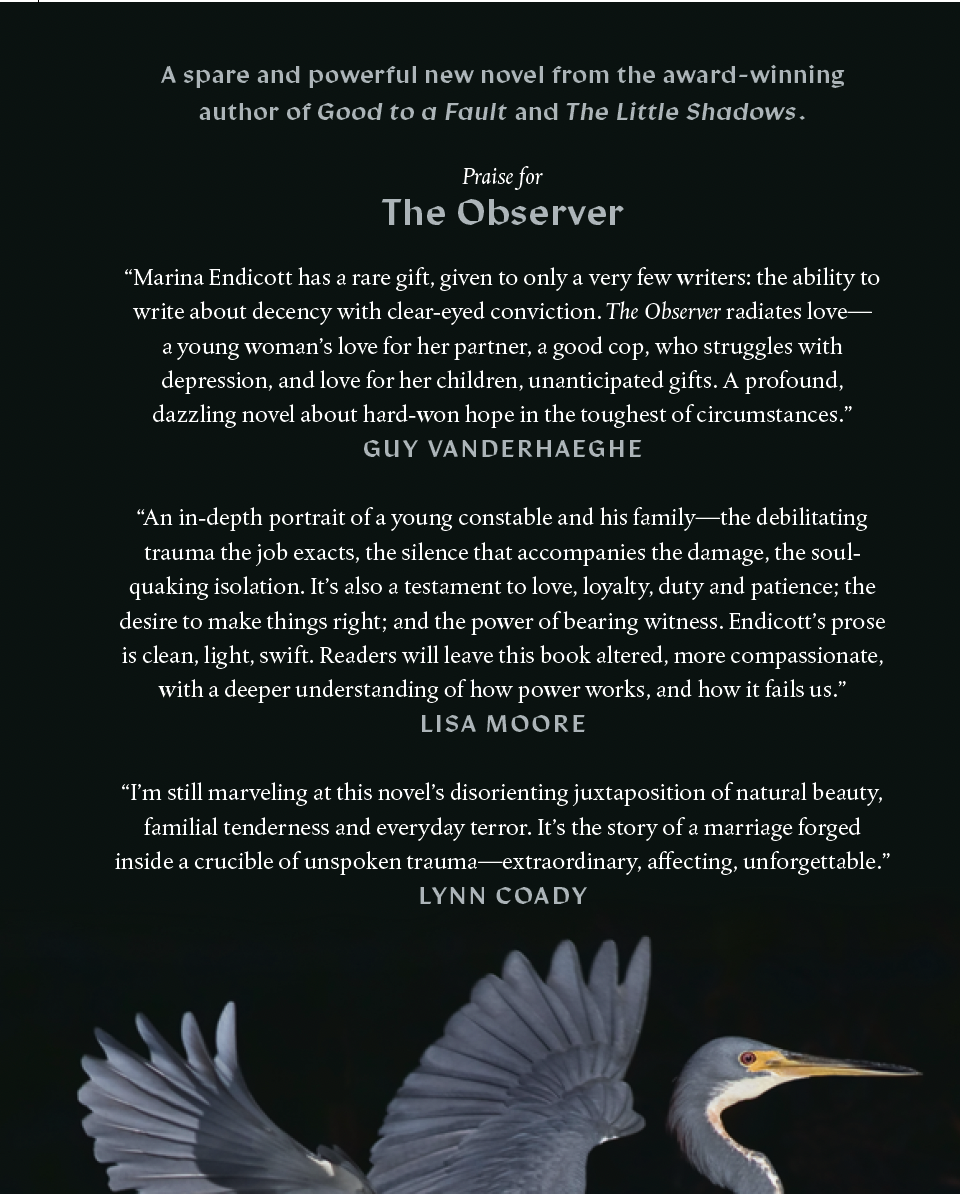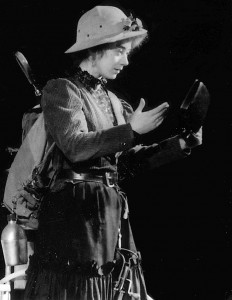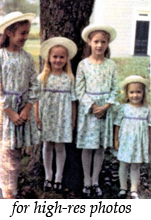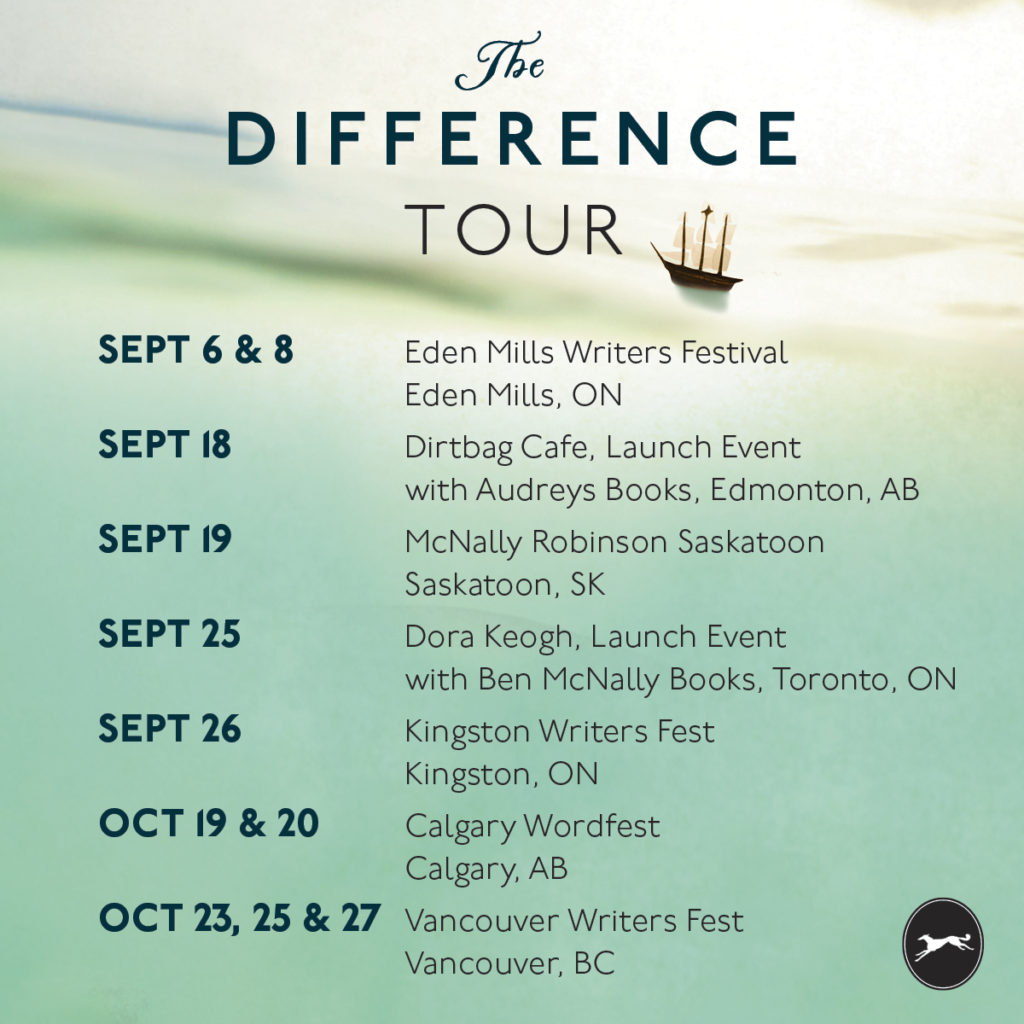Marina Endicott on the Job of Art Globe and Mail September 2023
The Observer is not a book about the state of policing, it’s about people. Two specific people: Hardy and his wife, Julia. From the position of specific personal experience, I’m writing about the way families are affected by that job. I hope I can be a useful witness, reporting fresh evidence in a case that sometimes seems to have already been decided. So I could not keep silent, I had to look back and revisit, re-examine that old trouble. I was surprised to find some tenderness in that revisiting, in Julia’s love for Hardy, her children and the wilderness around them.
Olga Tokarczuk writes about that kind of love: “Tenderness personalizes everything to which it relates, making it possible to give it a voice. … Tenderness is the most modest form of love. It is the kind of love that does not appear in the scriptures or the gospels, no one swears by it, no one cites it. It has no special emblems or symbols, nor does it lead to crime, or prompt envy. It appears wherever we take a close and careful look at another being, at something that is not ourself.”
A close and careful look at another being, exactly.
The Observer
The Observer is a quiet book, a small book that sneaks up on you, insinuating itself in your heart before it bursts at its seams, that grows to envelop the extremities of human experience, rendering them with a powerful grace and beauty. Robert Wiersema, Toronto Star


Born in Golden, BC, Marina Endicott grew up in Nova Scotia and Toronto. She began her career as an actor and director in Ontario and England, where in the gaps in work she began to write fiction. Back from London, she went west to Saskatoon to work in theatre, mostly in new play development as a director and dramaturge, before going farther west to Mayerthorpe, Alberta, for her husband’s first posting with the RCMP. Her first book, Open Arms, was short-listed for the Amazon First Novel award. Her second, Good to a Fault, a finalist for the 2008 Giller Prize and a CBC Canada Reads choice, won the Commonwealth Writers Prize (Best Book, Canada/Caribbean). The Little Shadows, shortlisted for the Governor General’s Award, and longlisted for the 2011 Giller Prize, as was Close to Hugh, one of CBC’s Best Books of 2015. Her new novel, The Difference, the story of a voyage to the South Seas in 1911, and is now out from W.W. Norton in the US as The Voyage of the Morning Light.
Representation
The Voyage of the Morning Light
Awash with vistas of beauty, the novel follows the deep pull of the characters toward harmony, justice, and home… shimmers with intelligence and humor. Christian Science Monitor, The 10 best books of June bring hope and insight
There is so much in this book to linger over, from Kay and Thea’s relationship with each other to the strength and autonomy of Kay’s mind to Endicott’s lyrical descriptions of the sea and the ship. It’s a novel to return to again and again… a quiet, elegant triumph with no easy answers. Kirkus Reviews, STARRED REVIEW
Endicott artfully combines a bracing world voyage and the equally transformative journey of a young woman discovering and honoring her genuine nature. With her passion for all the creatures and cultures she encounters, Kay shines as a timely embodiment of the solace of human connection across time and space. BOOKLIST STARRED REVIEW
PRAISE FOR THE DIFFERENCE:
Winner of the Robert Kroetsch Edmonton Book Prize 2020
A beautiful book, so lovely in its graveness, and in its comedy … The cut of the prose is so keen and the happenings are so finely wrought that it contorts where it can’t help but contort, around the places where unanswerable grief comes into our lives. —Helen Oyeyemi
The Difference is an immersive reading experience, the kind that makes one think, and think again. How movingly the novel considers the otherness between people, between the world and us, between human and all other life. Its boldness has a deep humility. Marina Endicott allows her characters to exist without being afraid of their (and our) moral dilemmas and failures, or the gap between our intentions and our understanding. She writes about goodness so well—so beautifully and joyfully. I loved being at sea with Kay and Thea, and found it hard to part from them. A wonderful, brilliant book. —Madeleine Thien, Giller Prize-winning author of Do Not Say We Have Nothing

Good to a Fault
Short-listed, Scotiabank Giller Prize 2008
Commonwealth Writers Prize, Best Book, Canada/Caribbean 2009, Canada Reads contender 2009, Dublin IMPAC Prize longlist, Calgary Book Award, Globe & Mail 100 Best Books, 2008
“With delicate precision, Good to a Fault tackles some of the big, eternal questions—love, mortality, God—in a deceptively modest story populated with very ordinary people brought together in extraordinary circumstances. Endicott’s wry, understated prose turns a few surprising months in Clara Purdy’s life into a gripping moral quest, searching to discover what it means to live a truly good life.”
— COMMONWEALTH WRITERS PRIZE JURY REMARKS, CANADA/CARIBBEAN REGION 2009
“Probing the moral and emotional minefield of heroic Samaritan acts, Endicott’s enchanting and poignant novel of compassion run amok handles provocative issues with a deft and winsome touch.”
— BOOKLIST (STARRED REVIEW)
“A brilliantly balanced and engrossing work about illness, charity, and the very tenuous nature of goodness. Fans of contemporary fiction exploring the dangers of complacency and how domestic upheaval can lead to personal growth will enjoy; think Anne Tyler, Elizabeth Berg, and Anita Shreve. Highly recommended for all fiction collections.”
—LIBRARY JOURNAL
“An enjoyable and affirming meditation on altruism, goodness, and loneliness…. A touching story.”
— PUBLISHERS WEEKLY
“Good to a Fault is an ingeniously plotted and brilliantly paced novel. It manages to be both witty and wise, light and dark, with many unexpected moments. The characters are drawn with sympathy and with very clear lines. What is most unusual about the book is how unlikely and odd the drama is and then how compelling and urgent it becomes.” — Colm Tóibín
“Marina Endicott is a sweet-natured but sharp-eyed and quick-tongued social observer in the Jane Austen-Barbara Pym-Anne Tyler tradition, who can wring love, revulsion and hilarity in a single page.”
— GLOBE AND MAIL (BEST BOOKS OF 2008)
“A study of goodness; of the motives—including the hidden ones—behind acts of charity, and the webs of emotion that are formed between the helper and the helped… always alert to shades of good and bad in people and in all they experience.”
—TIMES LITERARY SUPPLEMENT
A single, childless woman selflessly takes into her home the three children of a woman whom she injured in an automobile accident. Or maybe she’s not selfless but has found a way to steal a family while appearing to be a do-gooder. A graceful and deeply satisfying novel.
—WALL STREET JOURNAL (BEST WOMEN’S BOOKS 2010)
Most of all, Good to a Fault lays bare the dread cloak of poverty, how it clings, leaving a trace as indelible as ink. The “whole dirty business of being human” is a challenge to all. And rising to the challenge of doing good, not out of selfish need but generosity, is even greater. The incipient tenderness of this novel makes it at times movingly difficult to read, but that tenderness also makes it compelling. In an age of slick and clever writing, substanceless as air, Good to a Fault incites tears. They are tears of pleasure, for a good story and for such good writing.
— Aritha van Herk, ALBERTA VIEWS
“There’s heartbreak, there’s joy, there are parts where you cry—and it’s very high quality writing.”
— Margaret Atwood, GILLER PRIZE JURY REMARKS
“Absolutely ingenious… as you were going along, you were thinking—turning the pages—‘This is simply delightful.’”
— Colm Tóibín, GILLER PRIZE JURY REMARKS
“The novel shows that the gift of love, even with tangled motivations, holds people together and makes it possible for them to go on. . . . Reminiscent of the work of Carol Shields, Good to a Fault is a profoundly humane novel.”
— VANCOUVER SUN
“Warm and witty. . . . Utterly engaging. With a theatrical sensibility, Endicott, an established playwright and dramaturge, beautifully illuminates the interior lives and stunted interactions of her cast of struggling strangers. . . . Told in time to the steady, poignant pulse of domestic life, and with sharp observations and characters so vulnerable they’re impossible not to care about, this is a novel that gets under the skin.”
— QUILL & QUIRE
“An Anne Tyler-esque domestic drama… Narrated with such lambent detail and compassion that it succeeds in casting a spell… A limpid, witty, humane talent to watch.”
— KIRKUS REVIEWS
“This book explores, in clear, beautiful language, what happens when acts of kindness become selfish. . . . Compelling, funny, and meaningful.”
— CALGARY HERALD
“Good to a Fault is sturdily old fashioned. The main protagonist worries about the state of her soul, the characters are a believable mix of strengths and weaknesses, and the narrative arc brings the novel to a satisfying close. Endicott’s prose is plain but purposeful, carrying the story through moments of sorrow and heartbreak as well as joy and comedy… Good to a Fault doesn’t offer any easy answers, but in its depiction of ordinary people facing hard choices and challenging situations, it rings true.”
— TORONTO STAR
“We are not here to be happy. We are here to be of service. If this was ever said to you, even in jest, while growing up, then Good To a Fault, by Marina Endicott (Freehand Books) is the perfect read for you. What motivates our good behaviour? Are we in fact selfish in our choices to do good? Are we seeking recognition for our good deeds? A wise friend said: Do your work; expect nothing in return; celebrate your accomplishment and start again. If you choose to do a good deed, good for you. I loved the book.”
—David Mirvish, Favourite Books of the Year, GLOBE AND MAIL
“Endicott’s writing is realistic, not unlike the writing of the now-deceased Canadian literary doyenne, Carol Shields, who wrote about ‘ordinary people doing extraordinary things’…. Though it’s a domestic story, there is a sense of urgency to the narrative, and the reader is constantly waiting for the situation to change, and for a fragile situation to deteriorate…. This is a novel that delivers and treats its reader with kindness and goodness.”
— VUE WEEKLY (CANADA)
“In Good to a Fault, Marina Endicott asks the penetrating question, what does it mean to be good?… Endicott explores the notion through one of the more endearing characters to appear in recent years on the Canadian literary landscape…. Endicott’s background in theatre, as both actor and director, are evident in the brisk pacing of the novel, the complex unfolding of plot and character…. The writing is undoubtedly assured, and though the subject is weighty, the prose is leavened with a gentle, loving humour.”
— GAZETTE (MONTREAL)
“A powerful, thought-provoking novel rooted in the minutiae of daily life and a fundamental sense of humanity…. A powerful study in character development and interaction…. It’s an embarrassment of riches, frankly. Good to a Fault, indeed.”
— EDMONTON JOURNAL (ALBERTA)
“As Jane Austen taught readers two hundred years ago, a few families in a small community are just the thing to write about. Endicott first has her character Clara create a community, which in itself is a small marvel, then the writer gets down to work providing pithy observations of the vital life that’s been made there. A lovely triumph.”
— SASKATOON STAR PHOENIX
“Good to a Fault is a brave book. When Christianity is so seemingly out of fashion, Endicott shows that the religion’s age-old images and issues are decidedly relevant in a contemporary context. More importantly, it’s possible that Good to a Fault provides a glimpse of the glorious and holy mess that just might be the kingdom of God.”
—UNITED CHURCH OBSERVER
“Endicott writes precisely and lucently, and sustains her novel well beyond any number of easy conclusions to provide a convincing case that some redemptive force is at work in the world, even if it’s just our own innate creativity and talent for finding love. It also has a welcome funny streak.”
— NATIONAL POST (CANADA)
Close to Hugh
Longlisted, Scotiabank Giller Prize 2015, CBC Best Books of 2015
“Delightful, tragic, gloriously elegiac and riddled with puns—Close to Hugh is just like life, only so much more beautiful for being art.”
Lynn Coady
Globe & Mail
“Marina Endicott’s oddly original and charming new novel, Close to Hugh, inhabits a particular geography involving a series of staircases. The two flights up to Hugh Argylle’s mother’s hospice bed; the concrete stairs from his friend’s condo by the river; the claustrophobic staircase with doors at the top and bottom at the home of Hugh’s ex-wife who is also, inconveniently, landlady to his new flame; and the steps leading to Hugh’s small art gallery just below his apartment, which is up another flight. Then there is the ladder upon which Hugh is standing, hanging strings of lights, when he falls. Falling is as much a motif in the novel as stairs are. Fall as in the autumn season and one’s autumn years, and as in to plummet. Down, like the direction and like feathers, the thing with which is hope, according to Emily Dickinson… Close to Hugh is also about puns and anagrams—words so conspicuous in their materiality—Jung and Buddhism, show business, homophobia, grief and friendship, flooded basements and vintage fashion. Its prose is stream-of-consciousness, like the river that runs through Endicott’s imagined city (a fictionalized Peterborough, Ont.), “where water pours into water like the soul pours itself into the world, over and over, looking for home…” The novel addresses huge questions about the meaning of life and the universe with remarkable specificity. “We are tiny, unknowable, unimaginably unimportant, far from everything, only close to each other,” one character observes, which on a macro level is the point of Close to Hugh—but, as the novel demonstrates, is also totally wrong. Because of how art itself brings the world into startling, vivid focus, and suddenly every little thing has meaning after all.”
Kerry Clare, Globe and Mail
Toronto Star
“Reading a new novel by Marina Endicott, I am often reminded of the work of the late Carol Shields, the casually understated depth of her talent. It’s not just that Endicott shares with the American-born, wholly Canadian Shields an impressive skill, a comfort in writing in whatever form or approach she chooses; she also shares with Shields a fundamental, deep-seated humanity… It’s a novel of connections and bonds, of community and relationships. And it’s not all dark: Close to Hugh is, at times, wildly funny, both broad and tightly focused. This humour, however, is somewhat misleading. While it has the feel of a comedy of manners (a sense amplified by the examination, within the book, of Oscar Wilde’s The Importance of Being Earnest), and may put some readers in mind of Robertson Davies’ Tempest-Tost (the first novel of the Salterton trilogy), Close to Hugh cuts far deeper, peeling back pretensions and facades in pursuit of those fundamental human truths so dear to Endicott, and to Shields before her.” Robert J. Wiersema, Toronto Star
Literary Review of Canada
“The book’s voice… is alive with impish humour, a deep reservoir of humanity and a gift for quirky, evocative phrasing. These have always been strengths of this Edmonton-based writer’s work, even in her first novel, the straightforward first-person Open Arms, but in Close to Hugh, her fourth novel, she has taken things to another level: it is more droll, more insightful and even better crafted than its predecessors. Every sentence in this book made me want to read the next one. The wondrous thing is that Endicott employs this distinctive voice entirely in the service of her characters.” Jack Kirchhoff, Literary Review of Canada
Quill & Quire
The weight of what we carry with us while travelling through life, and the pain we suffer in doing so, is the foundation upon which Endicott structures her story… Close to Hugh could be said to encompass universal philosophical themes, but to Endicott, they are almost molecular, focusing on invidual lives and the potentially defeating moments in the day-to-day existence of a small group of people: “How we learn to bear the bad parts, how we figure out how things could be better. How we can live with others, how we can bear to live alone… People don’t understand each other and yet they keep working to, because they love each other.” (Laurie Grassi)
The Little Shadows
Globe & Mail 100 Best Books of 2011
Shortlisted, Governor-General’s Literary Award 2011
Longlisted, Scotiabank Giller Prize 2011
“Different as The Little Shadows is from its predecessor, it has Endicott’s wry sensibility, her pithy lyricism and her skill at pulling the rug out from under the reader’s feet. Like the previous novel, this one also concerns itself with big ideas: the point of art, sisterly and familial love and, as the war’s shadow extends and darkens, the meaning of life itself. Endicott is at her most magical when she describes their singing and dancing acts. Her love for this material, her confident musicality and her understanding of the sometimes subtle relation between emotion and art is nothing short of wondrous… This novel is redolent of the small-to-large western cities of a century ago. But its beautiful conclusion happens on a farm near Qu’Appelle, Sask., where the sisters reunite as the war looms large. Bella’s husband is enlisting, the once astoundingly agile Victor has been wounded and Aurora is (with one important exception) alone, where she is always happiest: ‘Not pretending, not folding herself small to fit in someone else’s grasp.’ In this rural peace (reminiscent of another pastoral final scene, in E.M. Forster’s Howards End), they talk about art and war and the pointlessness of it all. Victor disagrees that art is pointless: ‘Perfecting it. Making it—realer, or less real… We are only pointing at the moon, but it is the moon.’ Aurora, Clover and Bella—each now accomplished in her true metier—embark on tour once more. That’s the Finale, or so you’d think. But in the best vaudeville tradition, there’s one last surprise in the Encore.” – Katherine Ashenburg, GLOBE & MAIL
“The Little Shadows is a theatrical event as much as a literary one…. In her efforts to reform modern readers into a turn-of-the-century audience, Endicott proves experimental. She rolls out whole evenings of vaudevillian entertainment, performers performing in real time. She forces us to relinquish our need for cinematic wizardry and literary tricks, to rely on our own unmediated sense of delight…. The Little Shadows is a novel about art and women, and personal fulfillment and the thrill of performing. But it is also a story about the rôle of the audience; Endicott celebrates the art of watching. Set against a backdrop of ice and snow and war, the book belongs to a Canadian tradition preoccupied with survival. At the same time, Endicott insists, art has always had its place. She has written an entertaining, moving and original work.” – Donna Bailey Nurse, NATIONAL POST
The Little Shadows should come with a warning label: You will stay up too late at night reading this book. And in the morning, your first thoughts will be about its characters. Are they all right? How will they manage? …The first two-thirds of The Little Shadows is a rollicking romp. We meet – and grow to love – at least a dozen outrageously eccentric vaudeville performers. We’re dazzled by their feats; we laugh out loud at their witty routines and even at their corny jokes (Time flies like an arrow; fruit flies like a banana)…Yet despite giving us chapters that grow inevitably darker, Endicott finds a way to maintain the gentle spirit of her story’s telling. In this way, The Little Shadows is nothing less than legerdemain. – Monique Polak, MONTREAL GAZETTE
“How fitting that a novel that features vivid descriptions of stunning displays of skill should be such a stunning display of skill itself… Like these three singing sisters, this book is clearly bound for greatness. With a background in live theatre, Endicott has a deep understanding of the unique and intimate relationship between performer and audience… Extensively researched, though never ostentatiously so, The Little Shadows conjures a richly detailed world. As with Guy Vanderhaeghe’s The Englishman’s Boy, we’re given the chance to experience our home turf in a different time. Endicott opens with a quote by Crowfoot that begins “What is life?” and that simple question really is the exploration at the heart of her novel. As the aging and broken performers lurch towards their final curtain, or the boys we’ve come to love return broken (or not at all) from the theatre of war, Endicott celebrates the tenacity of life. As entertaining as it is profoundly moving, The Little Shadows will leave you crying for an encore.” – WINNIPEG FREE PRESS
“Besides her obvious research into vaudeville and its colourful people, Endicott mines her own life on either side of the curtain to show us how these young women come into themselves as performers, even as they grow as women, with particular tastes, trials and triumphs… To go from glum from not eating, from covering a bruise or from hiding a pregnancy to a “sudden froth of mirth” is what these young women must do, every night and matinee. The astonishing amount of work that makes it all look easy, as well as their increasingly outlandish adventures, is what makes Endicott’s new novel a gradually unfolding marvel to behold.” – SASKATOON STAR-PHOENIX
“Within an hour… I was the happy captive of three gorgeous teenage women, Aurora, Bella and Clover, and their indefatigable Mama, along with a vividly irrepressible cast of actors, singers, impresarios and cads — all alive and rampaging through a story that, as Canadian novels tend to go, is long (nearly 550 pages) but wasn’t long enough for me. I don’t want to diminish the accomplishment of this book by using tired adjectives of description (brilliant, compelling, rich, dramatic, sexy) or understate the power of the characters (funny, strong, tragic, brave and, yes, sexy) — so I’ll simplify: the best book I’ve read in a long, long time; it deserves to be a contender for every major literary prize this fall.” Linden MacIntyre, Recommended Reading, cbc.ca
Open Arms
“Open Arms, by Marina Endicott, meets one of my major criteria for successful novels: three weeks after reading it I can still recall characters, scenes, and events… Endicott is an excellent storyteller and this is a substantial, sweet-natured novel, full of hope and promise.”
–W. P. Kinsella, Books in Canada
“[Endicott’s] novel offers lucid, unembellished prose that hides convolutions of deeper meaning. Six girls and women are the linked heroines of this deceptively episodic tale–deceptive because events scattered over thousands of miles and several decades are finally fused into a striking emotional whole, a continuum of fractured, rarely spoken, but persistent and mysterious love.”
–The Globe and Mail